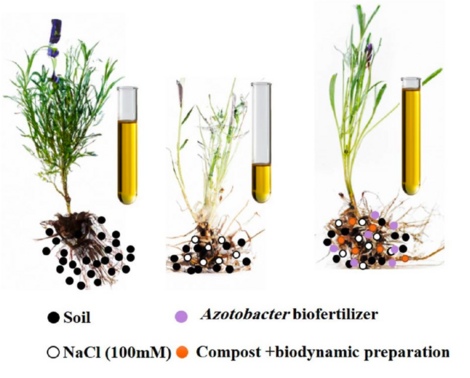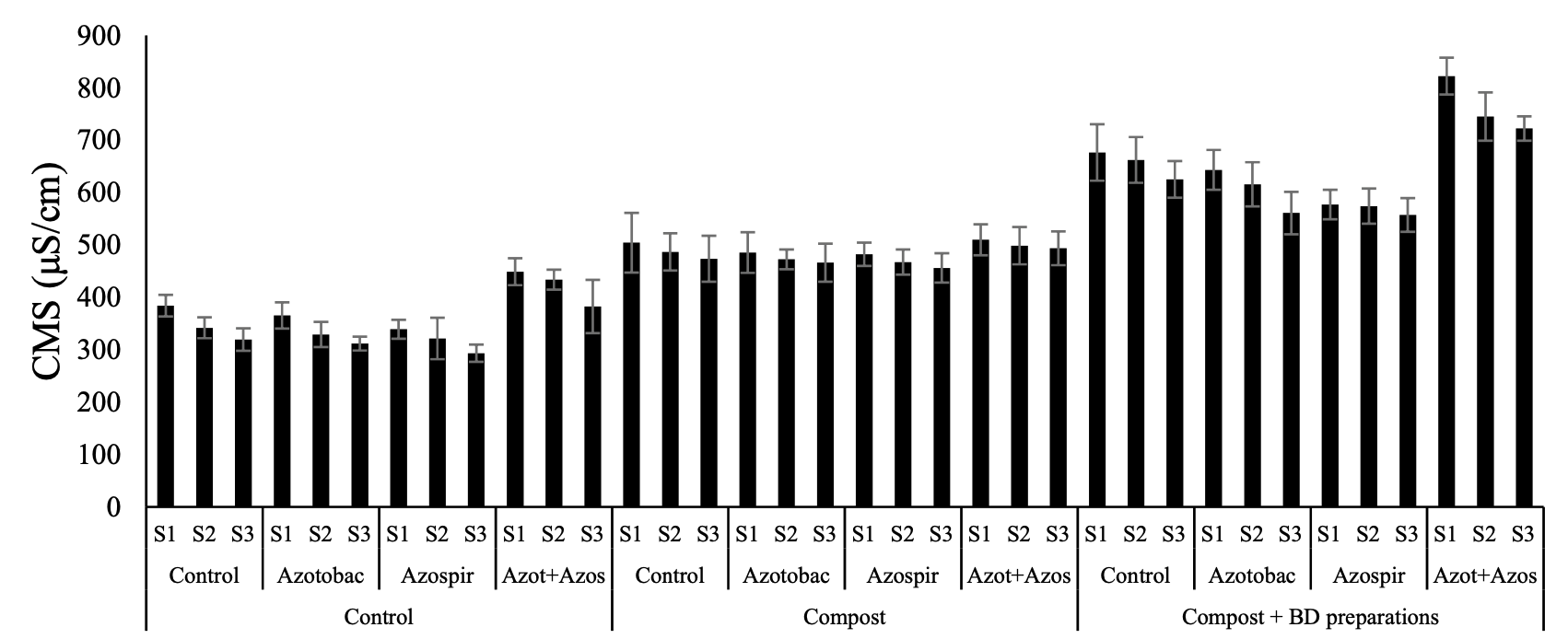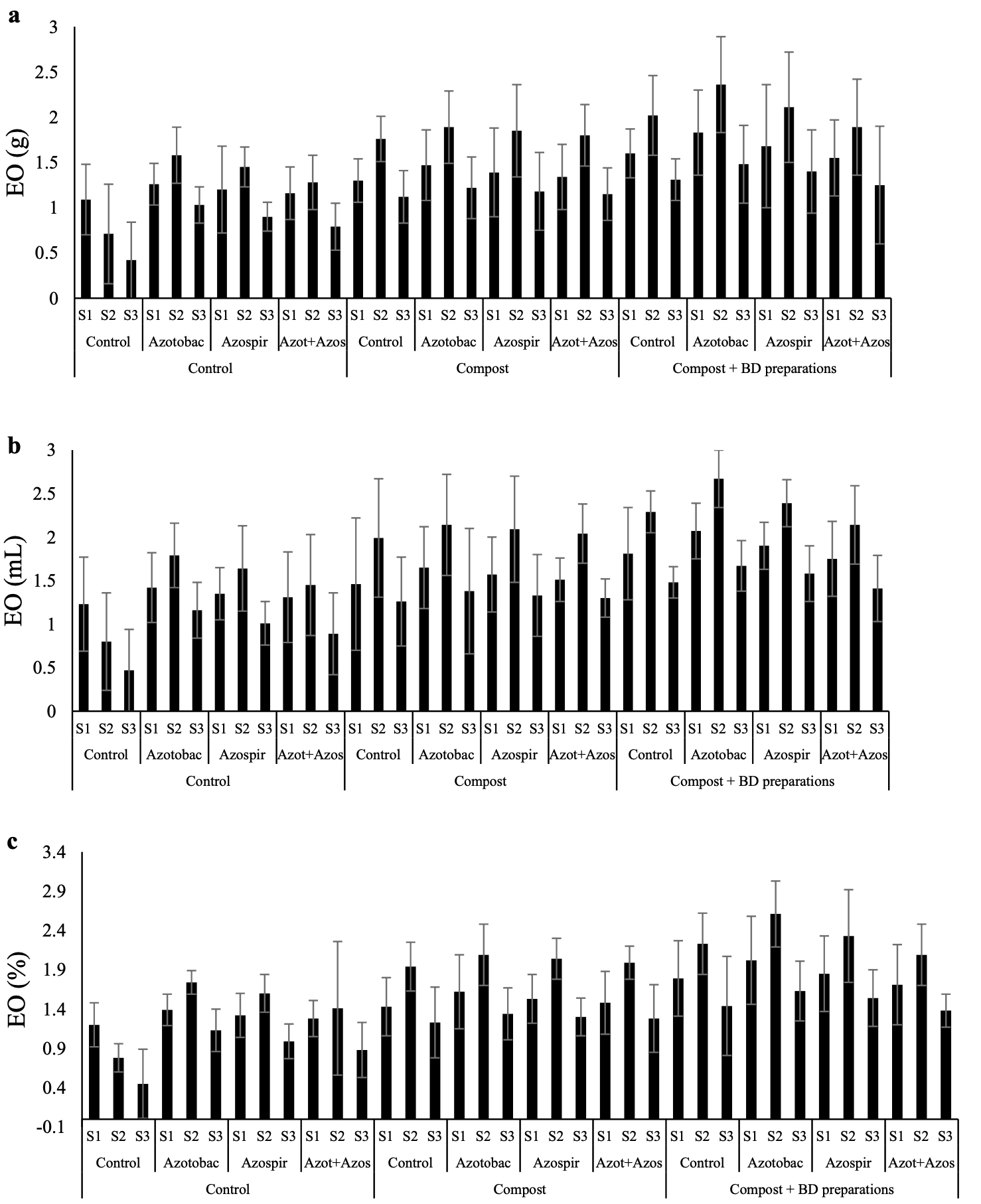Figure 1: Cell membrane stability (CMS) of lavender in the control experiment (left), with added compost (centre) and with added compost and the biodynamic preparations 502 to 507 (right) with the inclusion of various PGPBs. S1, S2 and S3 stand for a salinity of 0, 50 and 100 mM.
The application of plant growth promoting bacteria (PGPB) and the use of compost and biodynamic compost preparations were able to mitigate the effects of increased soil salinity. While salt stress lowered auxin levels and increased proline levels, a combination of PGPBs and biodynamic compost was able to raise auxin concentrations and lower proline levels. The reduced cell membrane stability could also be compensated by a combined application of PGPBs and biodynamic preparations (figure 1). The highest content of essential oils was observed in the treatment with biodynamic compost and the use of Azotobacter bacteria.
The results confirm the negative influence of increased soil salinity as well as the mitigation of these effects by the applied preparations. Compost treated with biodynamic preparations enriches the soil with nutrients without increasing the salt content and also improves the availability of trace elements. Azotobacter bacteria can fix atmospheric nitrogen and make it available to the plant. They also produce growth hormones. The combined application of compost, preparations and Azotobacter led to the best results at both low and high salt concentrations, including a higher yield of essential oils (figure 2).
Figure 2: Effects of the control experiment (left), added compost (centre) and added compost with biodynamic preparations (right) on the weight (a), volume (b) and percentage (c) of essential oils (EO) in lavender. S1, S2 and S3 represent a salinity of 0, 50 and 100 mM.
Deepening
What are the causes of increased soil salinity?
The accumulation of salt in the soil is usually a gradual process that takes place over decades. The most common causes include irrigation with saline water, over-irrigation and the application of saline fertilisers. Semi-arid and arid regions, where evaporation tends to outweigh precipitation, are most frequently affected.
What effects does salt stress have on plants?
Salt removes water from plant cells and thus leads to osmotic stress. In addition, salt ions disrupt nutrient uptake, favour deficiency symptoms and have a toxic effect on most plants above a certain concentration. The results are stunted growth, a reduction in harvest quantity and quality and, in extreme cases, the complete death of the plant.
What aspects of this study are particularly interesting from the perspective of biodynamics?
The results of the study suggest that the use of biodynamic preparations in combination with compost and PGPBs increases cell membrane stability even under salt stress, lowers the stress indicator proline and increases the production of essential oils. It is also exciting that the compost preparations not only help to reduce plant stress, but also increase nutrient availability in the soil and improve plant health.
What are the limitations of this study?
A few points should be considered when interpreting the study results:
- The experiment took place in a greenhouse. Parameters such as temperature, humidity and soil conditions are strictly controlled. Therefore, the results of this study cannot easily be transferred to field conditions.
- The experiment took place over two years, but normally salinisation occurs slowly over the course of decades. Long-term effects of the PGPBs, compost and preparations used were also not investigated.
- Only lavender was examined as part of the study. Other plant species could react differently to the treatment.
- Economic profitability is a decisive factor for farmers, but a cost-benefit analysis was not carried out in this study.
Overall, the study by Khatami et al. offers promising results. The use of compost, biodynamic preparations and PGPBs can provide a sustainable solution on agricultural land threatened by increasing salinity. Increasing the production of essential oils in lavender plants can contribute to the stabilisation of agriculture in salt-affected areas.
Sources and further links for this article
- Original study: Khatami, S. A., Kasraie, P., Oveysi, M., Moghadam, H. R. T., Ghooshchi, F. Impacts of plant growth-promoting bacteria, compost and biodynamic compost preparations for alleviating the harmful effects of salinity on essential oil characteristics of lavender. Chem. Biol. Technol. Agric. 10, 110 (2023). https://doi.org/10.1186/s40538-023-00485-6
- The study is covered by Creative Commons (link to license) and has been summarized for this study report.
- Study report «Who is actually fertilising whom?»


